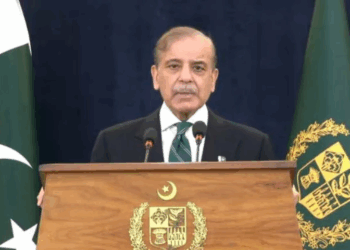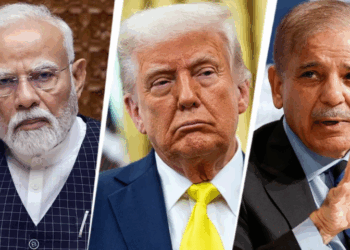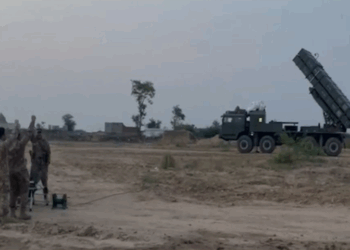Islamabad, April 30, 2025: Amid heightened tensions with India, Deputy Prime Minister and Foreign Minister Ishaq Dar reaffirmed on Wednesday that Pakistan will not initiate hostilities but will deliver a robust response to any act of aggression.
Speaking at a joint press conference in Islamabad alongside Director General Inter-Services Public Relations (ISPR) Lt Gen Ahmed Sharif Chaudhry and Foreign Office Spokesperson Shafqat Ali Khan, Dar condemned recent Indian accusations and emphasized Pakistan’s commitment to peace — but not at the cost of its sovereignty.
The remarks followed the deadly April 22 attack in Pahalgam, Indian-occupied Kashmir, which killed 26 civilians, mostly tourists, marking one of the worst attacks in the region in decades. While an initial claim of responsibility was attributed to the Kashmir-based group The Resistance Front (TRF), the group later unequivocally denied involvement.
Despite the lack of evidence, Indian officials quickly implied Pakistan’s complicity — allegations that Islamabad has strongly denied. Prime Minister Shehbaz Sharif has since called for an impartial international investigation.
“The entire region is under threat due to the politically motivated and provocative atmosphere being manufactured by India in the aftermath of the Pahalgam attack,” Dar said.
He reiterated Pakistan’s position: “We will not be the first to escalate. But if provoked, our response will be firm and immediate.”
Dar emphasized Pakistan’s unambiguous stance against terrorism, citing Quranic principles on the sanctity of human life. “No cause justifies the killing of innocents. Pakistan has consistently condemned terrorism in all forms and manifestations.”
Offering condolences to victims of the Pahalgam attack, Dar added, “As a nation that has suffered over 80,000 lives lost and more than $500 billion in cumulative losses due to terrorism, Pakistan understands this pain all too well.”
He accused India of glorifying its own assassination campaigns and sponsoring terrorism within Pakistan. “India has a pattern — it weaponizes baseless allegations for political gains,” Dar said, referencing the Pulwama incident and what he called a “familiar script” aimed at deflecting attention from Kashmir and India’s domestic failures.
Dar warned that India’s recent steps — including hints at suspending the Indus Waters Treaty (IWT) — were “unilateral, illegal, and dangerous.” He stressed that the treaty cannot be altered without mutual agreement and declared that any attempt to divert Pakistan’s water share would be treated as an act of war.
“This is not just a treaty issue; it’s a matter of survival for our agrarian economy and millions of Pakistanis who depend on these waters,” he stated. The National Security Committee (NSC) has declared that any violation of Pakistan’s water rights would meet with decisive resistance.
The foreign minister urged the international community to see through India’s “Islamophobic narrative” and to hold it accountable for transnational crimes, including alleged state-sponsored assassinations abroad. “Isn’t it time the world confronts India’s reckless brinkmanship and its consequences for a nuclearized region?” he asked.
Lt Gen Chaudhry, addressing the press, questioned the speed at which India pinned blame on Pakistan. He pointed out geographical inconsistencies, noting that the attack site is deep inside Indian-held territory, far from the Line of Control, and surrounded by difficult terrain.
Displaying satellite visuals, he questioned how an FIR could have been registered within 10 minutes of the incident when the nearest police station was 30 minutes away. “It appears choreographed — from prediction to execution to blame — following a familiar pattern,” he said.
The ISPR chief also highlighted a disturbing trend of Indian social media accounts glorifying attacks on Pakistan, often ahead of time. He noted previous instances, including the Mianwali attack and the Karachi assault on Chinese nationals, where similar online patterns were observed.
Further, Chaudhry raised concerns over reports of Pakistani prisoners in Indian custody being used in fake encounters and falsely labeled as infiltrators. “We have credible intelligence that India has activated its proxies to conduct terrorist activities inside Pakistan post-Pahalgam,” he said.
He cited Pakistan’s record of counterterrorism operations: 3,700 incidents since January 2024, with over 77,000 operations conducted, 1,666 terrorists killed, and nearly 4,000 casualties suffered.
Both Dar and Chaudhry emphasized Pakistan’s commitment to regional stability but warned that continued Indian provocations, disinformation campaigns, and Islamophobic rhetoric were dragging the region toward volatility.
“Pakistan has condemned the Pahalgam attack unequivocally. We issued a statement of condolence from Ankara within hours of the news,” Dar said, refuting claims that Islamabad delayed its response. “We have called for an independent, transparent international investigation — we have nothing to hide.”
FO spokesperson Shafqat Ali Khan also raised doubts about the legitimacy of the Indian investigation, pointing to irregularities in the FIR registration and the rapid speed of accusations. “It raises serious questions about intent and timing,” he said.
In closing, Lt Gen Chaudhry emphasized that the questions raised by Pakistan resonate not just within its borders but among Kashmiris and even some Indian voices. “Terror is being used for political objectives. We saw this with Pulwama, and we see it again in Pahalgam,” he said.
He added that India’s state-sponsored terrorism extends beyond Pakistan, affecting countries like Canada, the U.S., and Australia. “This is not isolated. It is strategic, deliberate, and dangerous.”
Dar concluded by warning of the broader implications of Indian belligerence. “Pakistan is alert. Our armed forces are vigilant. We will respond — at the time, place, and manner of our choosing — if provoked.”







